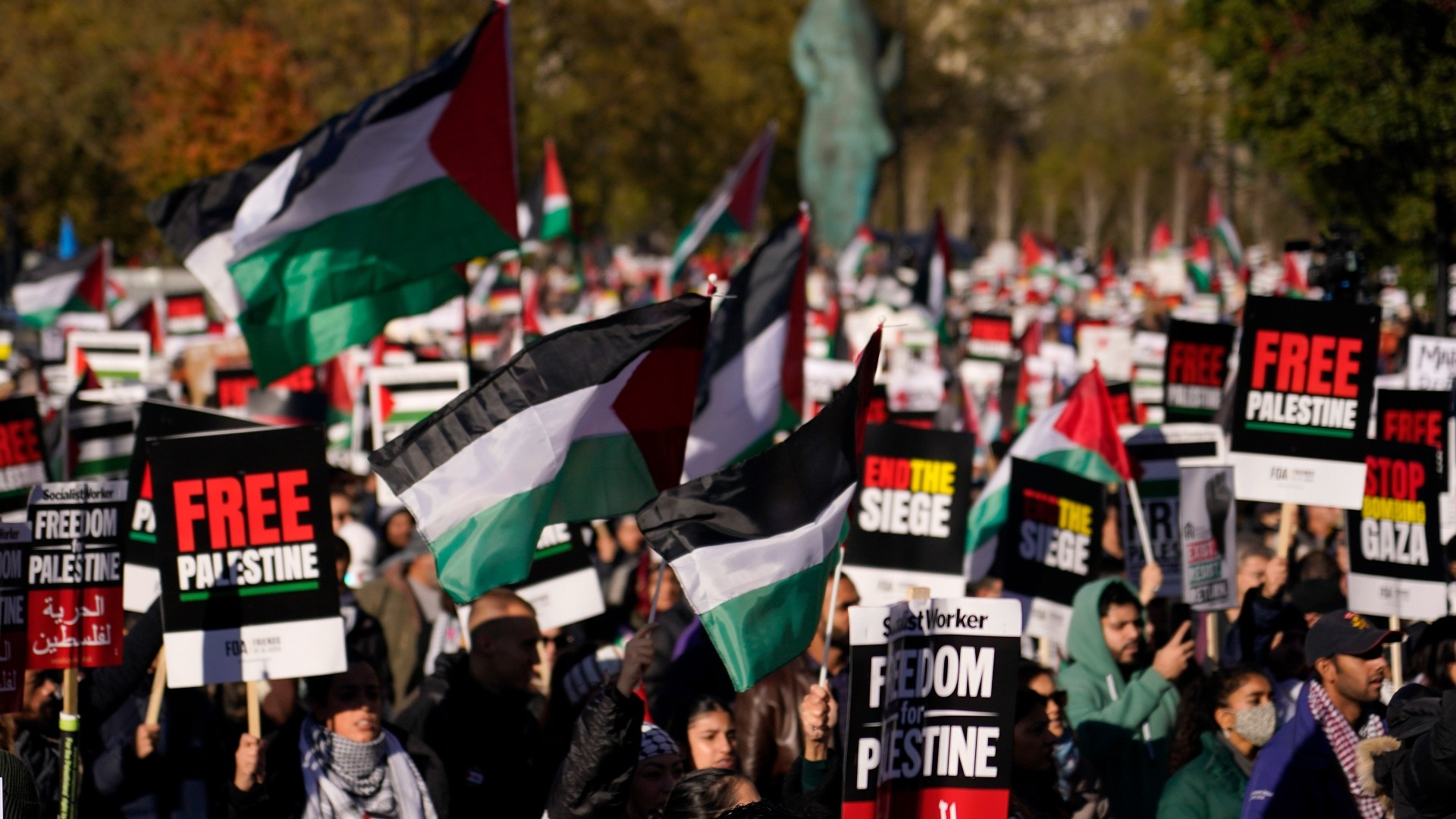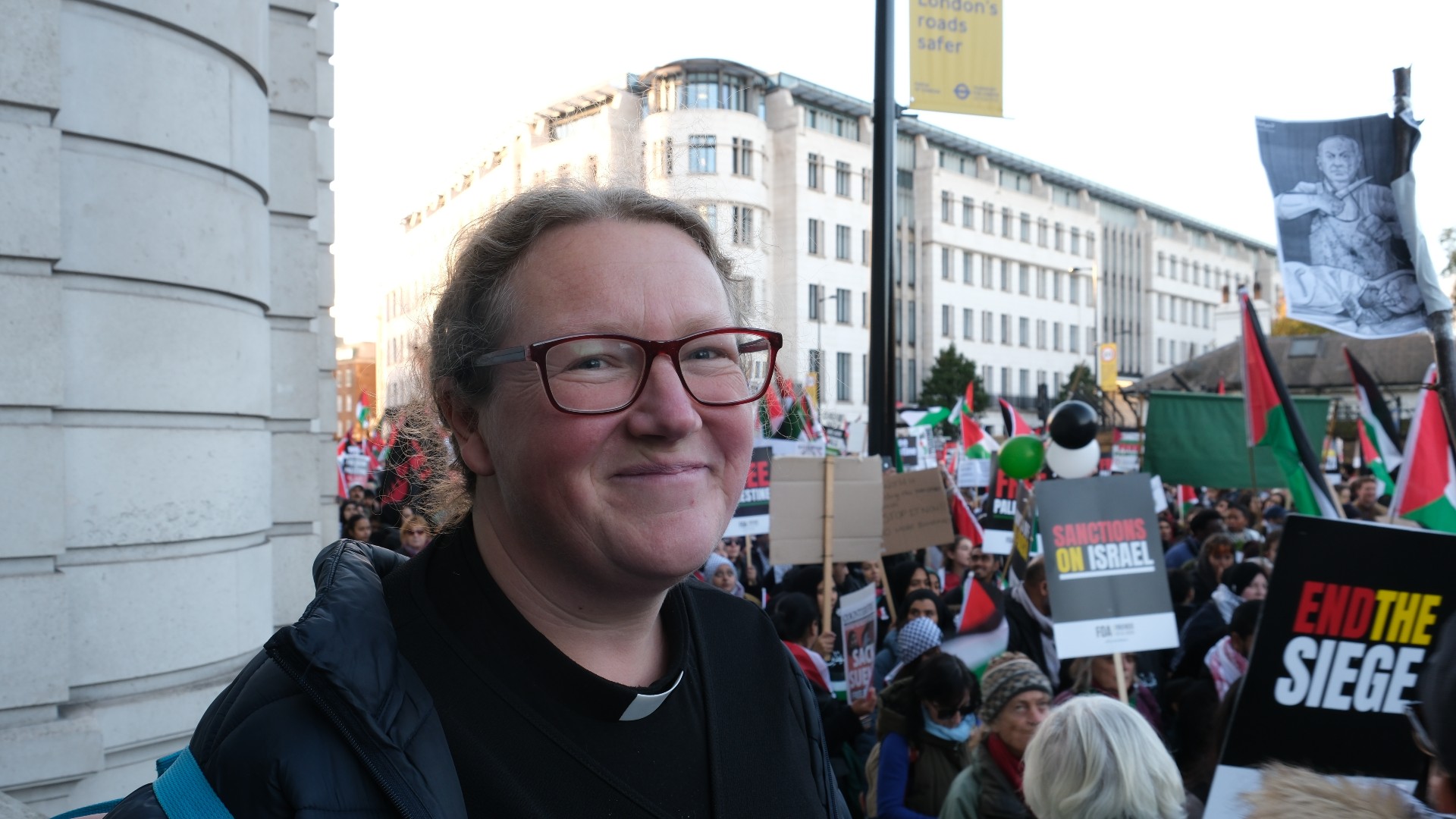Israel-Palestine war: 'Up to one million' take part in London protest

As pro-Palestine demonstrators around the world defiantly marched on Saturday, whether in the streets of Cape Town or the avenues of Paris, central London was a blur of red, green, white and black, the colour of the Palestinian flag, as hundreds of thousands marched in Hyde Park, calling on the UK government to push for a ceasefire in Gaza.
Organised by the Palestine Solidarity Campaign (PSC), the protest drew criticism from the British prime minister and home secretary because it coincided with Armistice Day, when people across the UK mark the moment the guns of the First World War fell silent in 1918.
Before Saturday, Prime Minister Rishi Sunak called the protest "provocative and disrespectful" for coinciding with Armistice Day.
Home Secretary Suella Braverman sparked widespread condemnation for an article she wrote in The Times, where she described those taking part in pro-Palestinian marches as "hate marchers" and went on to accuse the city's Metropolitan Police of "playing favourites" with left-wing groups over right-wing and national activists.
But the protesters on Saturday were undeterred.
New MEE newsletter: Jerusalem Dispatch
Sign up to get the latest insights and analysis on Israel-Palestine, alongside Turkey Unpacked and other MEE newsletters
"I can't think of a better day to march for peace than Armistice Day," said Mother Rachel Summers, a trainee vicar in the Church of England. "Twenty-one years ago, I went to visit Gaza. When I came back, I was saying to everyone I met: 'How are people managing to keep their humanity? These are intolerable conditions. How are people surviving?"
"Peace isn't some airy-fairy idea where people sit around doing nothing. Peace is something that takes strength and courage, and that seems to be what I'm hearing here," she said.
Reminiscent of the front page of London's Evening Standard newspaper the night before the march, among the many signs at the demonstration were ones bearing the images of both the poppy and the Palestinian flag, a comfortable juxtaposition of two causes by members of the public that was not shared by the government.
"Armistice Day is about celebrating peace and the end of war," said Dawn Bavington, a demonstrator who wore both a poppy commemorating Armistice Day and the Palestinian flag. "I feel really strongly that we need to remember the victims of all wars."
In London, up to one million pro-Palestine protesters rallied, demanding a ceasefire, according to organisers.
— Middle East Eye (@MiddleEastEye) November 11, 2023
This comes after British government officials attempted to ban the demonstrations, citing its coincidence with Armistice Day commemorations pic.twitter.com/fC1imDkshs
Much of the London underground rail system was not fully operational in the morning. But the march, one of the biggest mass protests in UK history, drew hundreds of thousands into central London. The organisers estimated a turnout of up to one million.
"We just made history," the PSC said in a tweet, showing the vast number of protesters marching in London. "In our thousands and in our millions."
At noon, demonstrators began gathering in Hyde Park, almost a mile from the Cenotaph war memorial on Whitehall, before marching to the US Embassy in Vauxhall on the south bank of the Thames.
Chants of "Free free Palestine" and "In our millions, in our millions, we are all Palestinian" reverberated across the streets of central London.
Kathy Cusack, who visited the occupied West Bank in the 1980s before the First Intifada, or uprising, broke out, arrived at the protest holding olive branches she had picked from her own garden.
"I brought the olive branches because I think peace and justice are critical messages to pass on globally," she said.
Since Israel began bombing the Gaza Strip on 7 October after Hamas killed around 1,200 Israelis and kidnapped some 200 hostages, over 11,000 Palestinians have been killed, over 4,500 of them children according to Gaza's health ministry.
More than 100 pro-Palestinian protesters were detained by police after breaking away from the march and launching fireworks. Also arrested in central London were at least 92 far-right counter-protesters, who claimed they were there to protect monuments but were in fact "intoxicated, aggressive and clearly looking for confrontation" and for "extreme violence" towards the police, the Met police said in a statement.
Prime Minister Sunak condemned the "wholly unacceptable" actions by both far-right "thugs" and "Hamas sympathisers" at the protests.
Even amid a shocking spike in antisemitic incidents, members of the British Jewish community still attended the march to show their solidarity with Palestinians.
"I feel especially as a British Jew that it's really important to show up and say Israel is not the same as Jewishness," said Rebekah, who did not share her surname.
Speaking about her mother, the child of Eastern European parents who survived the Holocaust and fled for New York, Rebekah said: "She feels like this war that's happening in Gaza is a desecration of the memory of those people who died in the Holocaust.
"It feels quite personal because we're being used as a justification, Jews more broadly and especially in the UK, to shut down debate and peaceful protest," Rebekah added, referring to claims that all criticism of the Israeli government is antisemitic.
Middle East Eye delivers independent and unrivalled coverage and analysis of the Middle East, North Africa and beyond. To learn more about republishing this content and the associated fees, please fill out this form. More about MEE can be found here.






